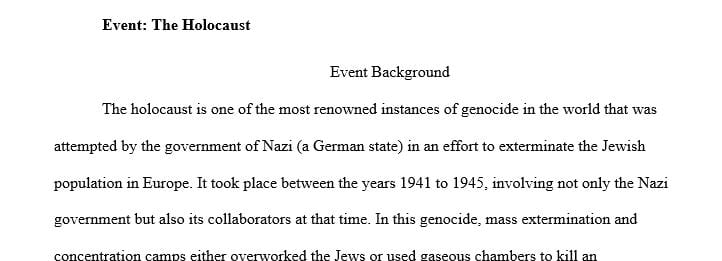Consider the role of the forensic anthropologist in a human rights or military context through case study.
The goal of this exercise is to consider the role of the forensic anthropologist in a human rights or military context through case study. Throughout the course we have discussed how popular media highlights the role of forensic anthropologists in criminal investigations. Our readings, particularly in Steadman’s case studies text, have highlighted how forensic anthropologists are valuable participants in other types of investigation as well. The student will choose one particular ‘event’ such as genocide, war, or mass disaster and use supporting outside sources to demonstrate their understanding of which government or non-governmental organizations led the recovery efforts, how forensic anthropologists assisted in the recovery effort, what methods for recovery and analysis were used, and evaluate the overall outcome of the investigation.
Description:
Our popular interest in forensic science and forensic anthropology often stems from an interest in popular media centering on murder investigations. Yet, forensic anthropologists regularly work in a variety of other contexts to help identify the remains of individuals that were victims of mass disasters, genocide, or war. For this assignment, the student will choose one specific event relating to these circumstances. The student will systematically identify the role of government agencies, non-governmental organizations, and forensic anthropologists in the recovery efforts. Students will describe the logistical issues in identifying remains in these unique contexts and discuss the outcome of the investigation and recovery efforts.
Write a 3-4 page narrative that includes the following:
1. Event background
a. Identify the specific mass disaster, genocide, or war that your assignment will focus on.
b. Summarize the event. When and where did it occur? How many people were affected?
c. Identify the various organizations involved in recovery. You may want to include information about how the recovery efforts were funded, who provided supplies, who completed the recovery and analysis.
d. Identify the forensic anthropologists involved. This need not be a personal identification. Were there forensic anthropologists there? Were they academics called in to consult for this project or are they permanently part of one of the supporting organizations? Were other specialty areas represented? For example: forensic odontologist, forensic botanist, pathologist, forensic entomologist?
d. Discuss some of the recovery issues that were/were not important in this particular event. Did these issues have an impact on establishing MNI, or individual identification and if so, how?
2. Significance and ethics
a. What was the overarching significance of this recovery effort? Individual identification and notification of loved ones is a given. What about larger issues? Did this investigation help us understand a sociopolitical event? Did it help us get a better understanding of how to prepare for similar events in the future?
b. Did this recovery effort lead to new discoveries or technologies in forensic anthropology? Did this recovery effort lead to changes in how organizations prepare for and respond to events of this nature?
c. Were all of the forensic scientists and other professional involved in the investigation working within their area of training and expertise? If so, why is that important? If not, why were they part of the investigation?
4. Works cited
a. Include two additional outside sources (no dictionaries or encyclopedias) in your write-up. One source must be a peer-reviewed scholarly source. You should both cite the sources to demonstrate how you used the sources in your assignment and also provide references. You should not use collaborative or personal opinion sources such as blogs, social networking pages, Wikipedia, Ask.com, Answers.com, Ehow.com, Encyclopedia Britannica, etc.
Answer preview to consider the role of the forensic anthropologist in a human rights or military context through case study.
APA
1156 words


